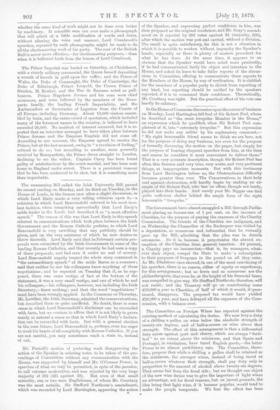Mr. Parnell's motion of yesterday, week disapproving the action of
the Speaker in ordering notes to be taken of the pro- ceedings of Committees without any communication with the House, was supported by himself and Mr. O'Connor Power, in speeches of what we may be permitted, in spite of the paradox, to call extreme moderation, and was rejected by the very large majority of 392 (421 against 29). But even of that small minority, one or two were Englishmen, of whom Mr. Courtney was the most notable. Sir Stafford Northeate's amendment, which was seconded by Lord Hartington, approving the action • of the Speaker, and expressing perfect confidence in him, was then proposed as the original resolution, and Mr. Gray's amend- ment on it rejected by 292 votes against 24 (majority, 268), after which the motion was put and carried, without a division. The result is quite satisfactory, for this is not a situation in which it is possible to weaken without impunity the Speaker's hands, especially as there is plenty of modern precedent for what he has done. At the same time, it appears to us obvious that the Speaker would have acted more prudently, if he had communicated fairly his object and intention to the House, and asked its leave to take fuller reports of the discus- sions in Committee, offering to communicate these reports to the Members of the House, by way of verification. It is childish for the members of a popular party to shrink from reporting of any kind, but reporting should be verified by the speakers reported, if it is to command their confidence. Theoretically, Mr. Courtney was right. But the practical effect of his vote can hardly be salutary.


































 Previous page
Previous page